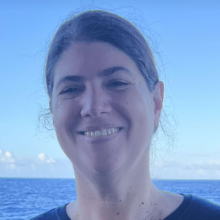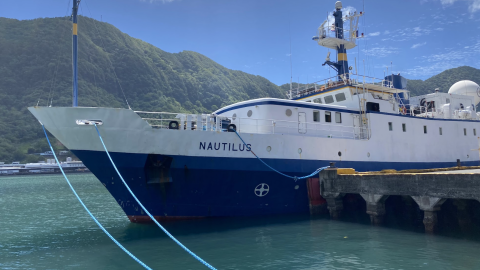
Val Brown
Tell us about your work/research. What kinds of things do you do?
I have worked with the National Oceanic and Atmospheric Administration (NOAA) in the Pacific Islands Region for many years and have participated in a wide range of projects from coral reef monitoring and assessment, to developing response plans and community monitoring programs, as well as coordinating ridge to reef restoration efforts. As the Research Coordinator for the National Marine Sanctuary of American Samoa, I lead the conservation science program and efforts to better understand and protect the amazing reefs at Fagatele Bay, the Valley of the Giants in Ta'u, Rose Atoll, and Swains Island and the ecosystem services they provide to the people of American Samoa. Most of my experience is in coral reef ecology and management, but I'm excited to expand those efforts to the deep-sea. I am particularly interested in understanding the effects of climate change and developing adaptation strategies to build resilience in ocean ecosystems.
What sparked your initial interest in your career?
I visited the Shedd Aquarium in Chicago when I was 10 years old and immediately fell in love with all of the coral reef animals in the big central tank. I decided then and there that I would become a marine biologist. I learned to scuba dive in college and became a scientific diver while I earned my bachelor's degree in biology. I traveled to the Cayman Islands for field studies and fell in love with reefs and the people that depend on them. I saw the impacts of a global coral bleaching event during those trips. That sparked an interest in marine resource management to help protect reefs and other ocean ecosystems and I've been doing just that ever since.
Who influenced you or encouraged you the most?
My mom, Rhondalynn influenced me a lot. She believed I could do anything that I set my mind to and encouraged me to follow my dreams. But it is the young people interested in protecting the planet that I meet and work with now, that keep me going.
What element of your work/study do you think is the most fascinating?
I don't think I can choose just one element. I work from the shoreline to the deep-sea and everything in between. There is always something new to learn or discover. Lately I've been really interested in how to use technology to monitor climate change.
How did you get involved with the Ocean Exploration Trust?
Ocean Exploration Trust has partnered with the National Marine Sanctuary of American Samoa since their first expedition here in 2019. When we heard they were interested in coming back we were happy to partner with them. As the Research Coordinator for the sanctuary, I was invited to join the cruise to provide insight into local management questions and science needs.
What other jobs led you to your current career?
It was really my field work during my undergraduate studies that led me to my current career. I started out on a more traditional academic path and thought I wanted to be a professor at a research university. But then I watched corals die from coral bleaching and disease, heard village elders talk about how the reefs had changed, met resource managers frustrated by impacts to coral reefs, and I decided that I wanted to do something more than study reefs. So, I switched to natural resource management with a focus on coral reefs in small islands and a joint program that helped me merge science and management. I've been doing just that ever since. I monitor and study the oceans so that I can help inform management and policy.
What are your degrees and certifications?
Bachelor of Science in Biology - Indiana University
Master of Public Affairs - Environmental Policy and Natural Resource Management - Indiana University
Master of Science in Environmental Science - Applied Ecology - Indiana University
PADI Master Scuba Diver Trainer
Emergency First Response Instructor
What are your hobbies?
I practice and teach yoga. I love to freedive. I also enjoy hiking, reading, and birdwatching. My favorite thing is hanging out with my nieces and nephews.
What advice would you give someone who wants to have a career like yours?
I tell students now to think beyond just marine biology. Look at this expedition, we have biologists, but we also have ROV pilots, photographers, videographers, data managers, engineers, mechanics, communications experts, ship crew and more. There are so many different paths. Don't be afraid to think big and outside the box. I think I've been successful because I take a pretty wide view of the world. I like to figure out how all the pieces fit together, how humans are part of the ecosystem, how the land influences the ocean and vice versa and that lets me see opportunities.
Expeditions
Val participated in the following Ocean Exploration Trust expeditions:

